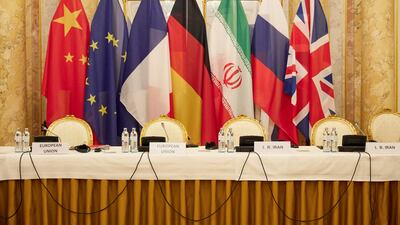Iran's chief negotiator Ali Bagheri Kani on Sunday said progress had been made in talks with global powers over its nuclear programme.
A new round of talks between Iran, the US and the EU began on Thursday to try to revive the 2015 deal limiting the programme, from which the US withdrew under Donald Trump in 2018.
US President Joe Biden has indicated he is willing to return to the agreement, but the US has accused Iran of backsliding on previous talks.
Iranian officials say they are serious about committing to talks but President Ebrahim Raisi, the country's new hardline leader, has led a new negotiating strategy that seeks to change the agenda.
“The two parties are at the point of agreeing on the matters which should be on the agenda,” Tehran's chief negotiator Ali Bagheri told the official IRNA news agency.
“It's a positive and important evolution since, at the start, they weren't even in agreement on the issues to negotiate.”
His comments came as the G7 said on Sunday that time was running out for Iran to agree on a deal.
UK Foreign Secretary Liz Truss said the Vienna talks were Iran's “last chance to come to the negotiating table with a serious resolution".
Her comments were the first made by a signatory to the original deal that gave an ultimatum for the talks.
Meanwhile, the Russian representative in Vienna has also expressed optimism. Mikhail Ulyanov tweeted: “Many diplomats don’t like to give interviews in order to be on the safe side. Probably they are right. This evening I was in rush but provided comments to journalists at their request. I was misinterpreted. Be aware that I assessed positively, not negatively the position of Iran.”
The 2015 agreement aimed to prevent Iran from developing a nuclear weapon, a goal Tehran has always denied. The deal ensured sanctions relief in return for tight curbs on Iran's nuclear programme, which was put under extensive UN monitoring.
According to Mr Bagheri, the new administration of Mr Raisi, in power in Iran since June, has raised additional points to those negotiated by its reformist predecessors.
Iran wants a lifting of all US sanctions imposed after Mr Trump's withdrawal, but Mr Biden's administration has said it will only negotiate measures taken by the former president over the nuclear programme, not steps imposed over other concerns such as human rights.
Tehran has presented two texts at the talks, one on the sanctions and the other on its nuclear activity.
“With the other parties we jointly recap (the points to discuss) in order that the differences can be resolved and the agenda established in a definitive framework,” Mr Bagheri said.


